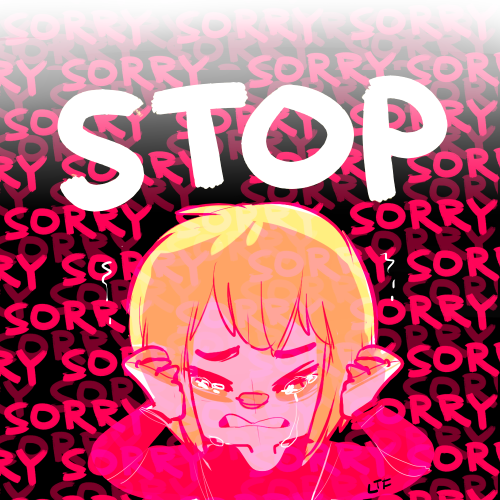unknownanonymousgirl: artistictaurean: heir-of-the-founders: apologieslogan: youreawizardsophie: inn
unknownanonymousgirl:artistictaurean:heir-of-the-founders:apologieslogan:youreawizardsophie:inner—utopia:ask-rainy-water-princess:genocidershodan:lemonteaflower:anxiety.Or, you know, you could just stop saying sorry.I take it you don’t have anxiety.You can’t “just stop saying sorry”. You do something, something so little, like accidentally bump into someone. You feel horrible about it. Your brain starts panicking and you have trouble trying to breathe. You stutter an apology. They say it’s okay, but you accidentally do it again, and you apologize again. They just say “Aha, you can stop saying sorry.” And you feel horrible that you’ve probably made them angry or upset, so you mutter out an apology for the third stupid time, and they just say to stop saying sorry. Stop saying sorry. You can’t just tell someone to stop saying you’re sorry.…Wow. I’m usually the one that tells people to stop saying sorry. I actually learned something on Tumblr, thanks!my best friend does this all the time. might I suggest that instead of telling people “stop saying sorry” to tell them something a little softer like “no need to apologize!” or “no worries”? I know the last one sounds a little contradictory for someone with anxiety, but as someone with anxiety, even small reassurances that it’s okay mean everything to me.I usually say something like “its okay, you didnt do anything wrong” if the apology seems like it comes out of nowhere. I’ll also ask what they think they did wrong and reassure them about that.I have absolutely no idea if this will help anyone because my anxiety doesn’t manifest this way, but if you tend to say sorry to a friend or family member (someone you can develop a code/in-joke with), my college roommate and I started saying “potato” instead of “sorry”. It was just a silly word to say that kind of stopped any need to feel like we were apologizing, even though we knew it was our form of apology. Something to distract us from saying sorry when we didn’t really need to. My great-grandmother was abused as a kid and then as an adult. She would get into sorry-loops where she would apologize for apologizing too much, and it would continue until she either cried or someone would calm her down. My grandmother learned sorry-loops from her mother (my great-gran). My mother learned from her mother (my gran). I learned from my mother. We all sorry-loop, and it is difficult to unlearn. Trauma is cross-generational. The trauma of one person has affected the next 3 generations of women. I’m going to do my best to stop the sorry-loops so my daughters don’t learn them too. -- source link
#apologies#sorry loops



